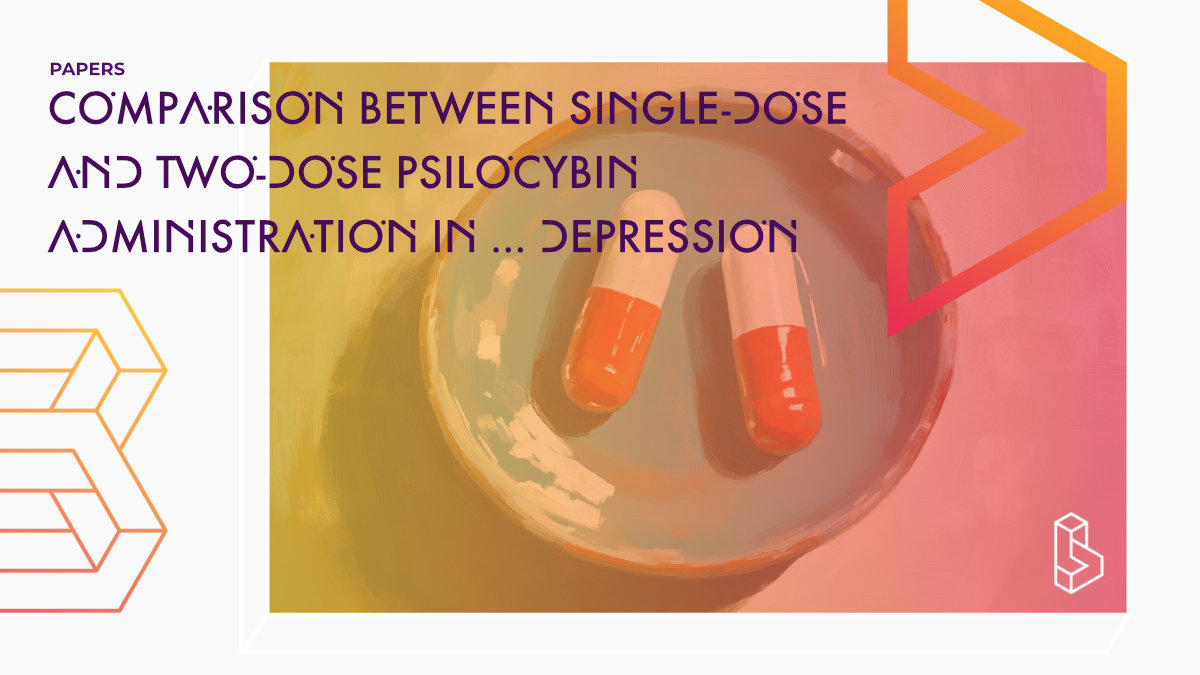This systematic review (2024) and meta-analysis (s=12) examines the therapeutic effects of single-dose and two-dose psilocybin administration on depressive symptom severity in MDD and TRD patients. It finds that psilocybin is highly effective in reducing depressive symptoms in both patient groups, with two-dose treatments potentially offering more pronounced and lasting effects (but no statistically significant difference).
Abstract of Comparison between Single-Dose and Two-Dose Psilocybin Administration in the Treatment of Major Depression
“Current pharmacological treatments for major depressive disorder (MDD) are often only partially effective, with many patients experiencing no significant benefit, leading to treatment-resistant depression (TRD). Psilocybin, a classical serotonergic psychedelic, has emerged as a notable emerging treatment for such disorders. The aim of this systematic review and meta-analysis is to summarize and discuss the most recent evidence about the therapeutic effects of single-dose and two-dose psilocybin administration on the severity of depressive symptoms, as well as compare the efficacy of these interventions among patients with a primary diagnosis of MDD or TRD. Articles were collected from EBSCOhost and PubMed following the PRISMA guidelines, yielding 425 articles with 138 duplicates. After screening 287 records, 12 studies met the eligibility criteria and were included in the review. A quantitative analysis of the studies indicates that psilocybin is highly effective in reducing depressive symptoms severity among patients with primary MDD or TRD. Both single-dose and two-dose psilocybin treatments significantly reduced depressive symptoms severity, with two-dose administration sometimes yielding more pronounced and lasting effects. However, it is unclear if this was solely due to dosage or other factors. Future research should include standardized trials comparing these dosing strategies to better inform clinical practice.”
Authors: Gianmarco Salvetti, Daniele Saccenti, Andrea S. Moro, Jacopo Lamanna & Mattia Ferro
Summary of Comparison between Single-Dose and Two-Dose Psilocybin Administration in the Treatment of Major Depression
Major depressive disorder (MDD) is a widespread mental health condition affecting a significant portion of the global population. Characterised by persistent low mood, loss of interest, and a range of emotional and physical symptoms, MDD can be debilitating and carry a substantial economic burden. While various psychotherapeutic and pharmacological treatments exist, a considerable number of individuals do not respond adequately to these interventions, leading to treatment-resistant depression (TRD).
Current medications for MDD, such as selective serotonin reuptake inhibitors (SSRIs), often have limited efficacy and can cause undesirable side effects, including sexual dysfunction, nausea, weight gain, and sleep disturbances. Moreover, these medications typically require a lengthy period to take effect, potentially increasing the risk of non-adherence to treatment and suicidal behaviour. This underscores the need to explore novel and effective pharmaceutical options. Psilocybin, a naturally occurring psychedelic compound found in certain mushrooms, has emerged as a promising candidate for MDD and TRD treatment.
Psilocybin as a Potential Treatment for Depression
Find this paper
https://doi.org/10.3390/brainsci14080829
Paywall | Google Scholar | Backup | 🕊
Cite this paper (APA)
Salvetti, G., Saccenti, D., Moro, A. S., Lamanna, J., & Ferro, M. (2024). Comparison between Single-Dose and Two-Dose Psilocybin Administration in the Treatment of Major Depression: A Systematic Review and Meta-Analysis of Current Clinical Trials. Brain Sciences, 14(8), 829.

